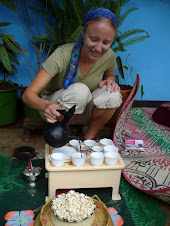My Peace Corps experience has entered into a new phase in two major aspects. First, I am living (mostly) alone, for the first time in my life. Peace Corps has finally been able to secure a house for KB, and she moved across town on Wednesday – a story in and of itself, but I feel it's KB's to tell. I can hardly say, though, that I'm truly living alone, as I have the company of my landlady, her twenty-year-old son, and a young male renter who works in a health facility, all no more than five yards away in back of the house. I am still greeted in the morning by ladylady's sing-songy "Kristiiiiiin! Indamin adderrrrrrk!" (Good morning!), I am still invited daily into her room for the coffee ceremony, and I am still regularly serenaded by Bob Marley pouring from her son's CD player. Furthermore, I can still fall back on KB's English-speaking, American-cultured companionship anytime I feel like biking across town to her kebele. KB and I were laughing the other day at the irony of our rather rare situation: We both signed up for the Peace Corps, a program that's entire premise is the placement of American volunteers ALONE in foreign communities for cultural exchange and professional assistance. Yet, neither of us can imagine having gone through half of what we've experienced here alone. Perhaps our fellow volunteers who are on their own will emerge from these two years stronger than will we…but we are certainly enjoying the short-term benefits of being here together.
Second, I am actually going into the office on a regular basis, which is a big change from my first two weeks here. I have been adamant that my first task here in Debremarkos is to learn as much as possible about the community, the culture, and the existing social structures, which I must understand in order to work within them effectively. Thus, my supervisors worked with me to compile a list of organizations doing HIV/AIDS-related activities in Debremarkos, and I will make an effort to visit each of them to observe their operations. My workdays have generally fallen into the following routine:
At 8:30 in the morning, I arrive on my bike at the HAPCO office. Sometimes Amoro has told me ahead of time what activity I will be observing and at which organization, but usually I show up unaware and preparing myself for anything. I chit-chat with the female secretaries in the office until Amoro arrives, a bit later than our pre-arranged appointment time but certainly within the reasonable expectations of habisha time. He informs me of the program for the day, ranging from facilitator trainings to recruitment for voluntary HIV/AIDS counseling and testing (VCT), and we ride off to our destination, he on his motorcycle and I riding behind on my 18-speed bike. We show up invariably in the midst of a large meeting already in progress. I am shown to a seat, a process involving an uncomfortable amount of fuss and generating an uncomfortable amount of attention. I listen to the introductions being made by each member of the assembly, straining through the language barrier and the faint Ethiopian voices to pick up the pattern I should follow. Finally, my turn comes, and I make my basic introduction, which, to my amusement, is met with rapturous, encouraging applause. Then, I settle in for hours of largely incomprehensible Amharic discussion, broken up by tea and coffee breaks every hour and a half. I glean what information I can from the proceedings, I monopolize the time of any English-speakers I discover, and I make lists of names, observations, and Amharic vocabulary to look up later in my dictionary.
While I miss out on most of the details of these meetings, and while I surely contribute nothing to the proceedings, this current work routine has been extremely valuable in meeting community members and in seeing various heretofore conceptual processes played out in the reality of Debremarkos. In one example of both, I accompanied the site selection committee for a USAID-funded mobile VCT campaign as it toured around Debremarkos to select locations for their next venture. I spent a lot of time talking with the two Ethiopian employees of the project and ended up having both lunch and dinner with them. Our lunch conversation having apparently gotten small-talk about work, family, and football out of the way, dinner resulted in a discussion about Ethiopian politics, culture, and inter-faith relations (the openness of which was perhaps encouraged by the bottle of red wine we shared between us). The full contents of this conversation I will not reproduce here, but one of the Ethiopians, a Muslim, in response to my questions about the fairly peaceful relationship between Ethiopians of different religions, shared with me an Amharic maxim: "The country is for all; religion is private." It is an interesting expression from a country with such visible public demonstrations of religiosity. Yet, at the same time, it seems to be an accurate reflection of how Ethiopians relate on an everyday basis to the religious preferences of their fellow countrymen.

No comments:
Post a Comment